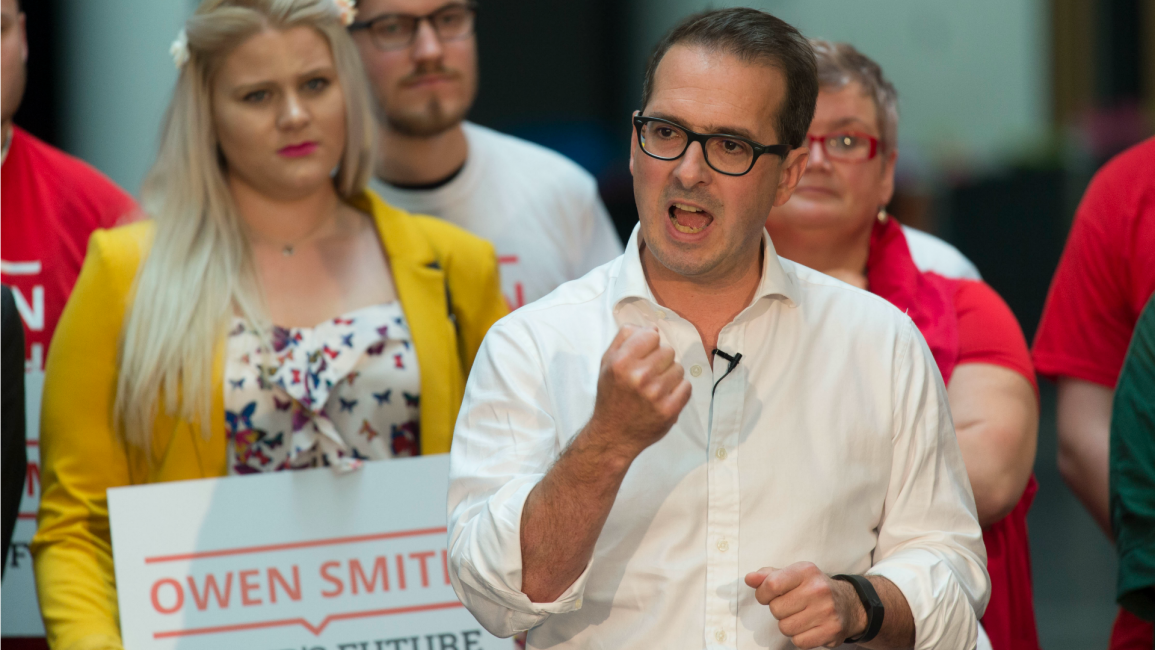
Smith to struggle in post-Chilcot Labour leadership race
Labour has shifted to the left under the leadership of Jeremy Corbyn, but old habits die hard and the challenge of Owen Smith for the Labour crown is steeped in Blair-era Labour foreign policy ideas.
Middle East policy is one area in which Smith will try to distinguish himself from Corbyn, and it is also likely to be a key factor in Corbyn winning his second leadership contest in twelve months.
The Chilcot Report confirmed a simple truth: War was a central tenet of the Tony Blair, "New" Labour project. The majority of the parliamentary Labour party (PLP) internalised this principle, but MPs challenging anti-war veteran Corbyn will struggle for credibility, post-Chilcot. It is difficult to see how Smith will be able to sell his ambiguity over Iraq, and war more generally, to the party's membership.
Leadership contest
The machinations of the new leadership contest will unfold over the summer, and a complicated state of affairs has already begun to emerge. Corbyn already has an overwhelming mandate, but MPs desperate to oust the leader have closed ranks against him, falling behind one candidate, Smith, who will try to appeal to Labour members desperate to defeat the Conservatives in an expected early general election. The leadership contest could be a battle to become the UK's next prime minister.
The vindication of the anti-war movement by Chilcot has not been embraced by those in the PLP wanting to dethrone Corbyn. At the exact moment that the ruling Conservatives were engulfed in post-EU referendum crisis, Labour MPs began their staggered resignations from Corbyn's shadow cabinet, in an attempt to force the leader to resign.
 |
Undeterred by PLP chaos, new members have been joining Labour in their droves |  |
Undeterred by PLP chaos, new members have been joining Labour in their droves. But the 100,000 who have signed up since 12th January are not automatically allowed to vote in the leadership election, and the cost of registering as a supporter has risen eight fold, in an effort to curb entryism.
The limits to members' right to vote might reduce the number of anti-war activists who can vote for Corbyn. Others on the left still balk at the thought of being a signed-up member of a party that has led the UK into disastrous wars in the Middle East with a death toll in the hundreds of thousands. Labour is seen by many on the left as harbouring colonial beliefs about Britain's role in the world.
Foreign policy clarity
Nevertheless, Corbyn will be able to put out a very straight forward and credible message on foreign policy, after all, he has been proved right on all the key issues since the "War on Terror" was declared in 2001. His expertise on the Middle East is a big factor in his popular appeal: A pacifist who doesn't play on fear.
The initial challenger to Corbyn, Angela Eagle, one of the most prominent MPs to resign from his shadow cabinet, voted for the Iraq war and against an investigation in to it. She also favoured renewal of Trident, the UK's nuclear weapons programme, something Corbyn opposed on principle. It soon became clear that Eagle was too clumsy and too lacking in moral authority to successfully challenge the leader.
 |
It is difficult to see how Smith will be able to sell his ambiguity over Iraq, and war more generally, to the party's membership |  |
Eagle is a useful point of reference: A relic of the Blair era, but also with some claim to socialist credentials. Like so many of her colleagues, her grasp of the importance of the Middle East appears woefully limited. Shortly after the publication of the Chilcot report, she made the tactless comment that Tony Blair had been "through the mill".
She made no mention of the hundreds of thousands of dead Iraqis, the destruction of a society and the rise of IS. Like her, many in the PLP remain loyal to Blair and are unlikely to back a motion of contempt against the former prime minister in the House of Commons.
Equivocal Smith
Owen Smith has attempted to position himself in between Eagle and Corbyn politically. He has talked up his "socialist" credentials, but his grasp of internationalism is much closer to Eagle than Corbyn. The former Work and Pensions Secretary recently claimed he was against the Iraq war. However, at the time he was not an MP, but a Special Advisor to pro-war Northern Ireland Secretary Paul Murphy and chose not to resign in protest.
In a 2006 interview, Smith claimed that the decision by Blair to attack was "complicated" and said that the Labour government was "making significant inroads in improving what is happening in Iraq". He gave no evidence to support the statement, and even went on to compare the invasion to the Welsh volunteers who travelled to fight Fascism in Franco's Spain of the 1930s.
 |
Corbyn will be able to put out a very straight forward and credible message on foreign policy |  |
On the issue of Blair's contempt of parliament, Smith has said he would not vote in favour of the motion. In this, like with Iraq, he could be misjudging the level of public understanding of the UK's role in the ongoing disaster in Iraq.
Smith is pro-Trident, and will attempt to position himself as a "realist" against Corbyn's "Another World is Possible" message. Expect the UK media to fall behind Smith in his attempts to portray Corbyn as an "unrealistic and loony", as they have been shown to do consistently since he became Labour leader last year.
Middle East ignorance
Smith will find it challenging to debate with Corbyn on foreign policy in the hustings over the summer. His ideas will not appear as fresh as Corbyn's, and his comments have already betrayed an ignorance of how public expectations have shifted since Blair's decision to follow Bush to war in 2003. The post-Thatcher consensus in UK politics is weakening, and the challengers to Corbyn are seeking to restore it.
That Labour MPs are no longer free to pursue hawkish foreign policy ideas without a serious challenge is one of Jeremy Corbyn's achievements, but one that is under threat.
Corbyn's strength is his popular appeal. His opponents' strength is their loyalty to the status quo, but in the current climate, they face an uphill task if they are to reclaim power.
Tom Charles is a London-based writer, editor and literary agent. He previously worked in the UK parliament, including as a lobbyist for Palestinian rights. He has contributed to Jadaliyya and the Journal of Palestinian Refugee Studies. Follow him on Twitter: @tomhcharles
Opinions expressed in this article remain those of the author and do not necessarily represent those of The New Arab, its editorial board or staff.



